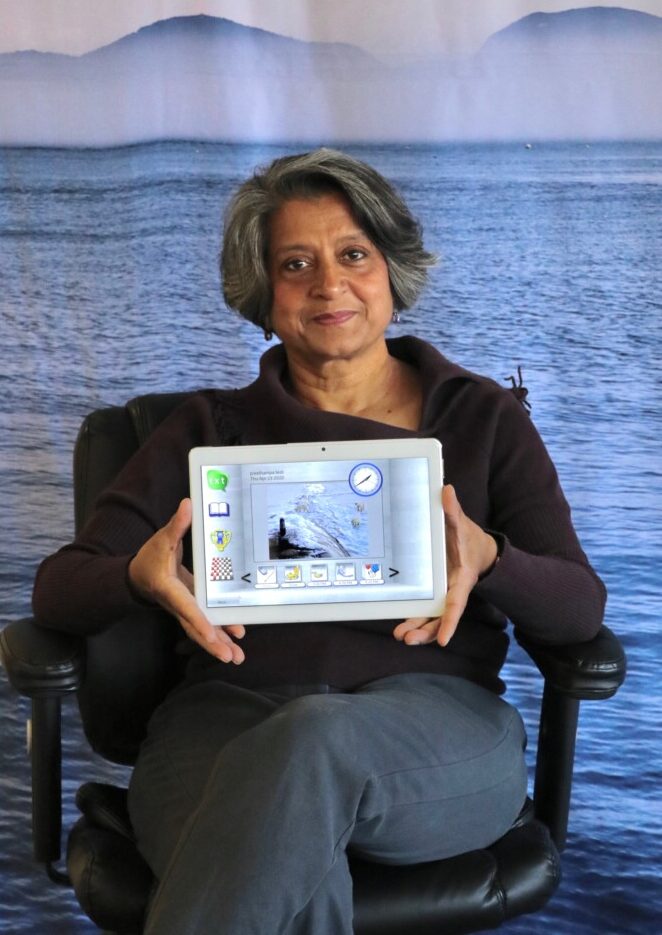When Tammy Green wakes up each morning in her Lewiston apartment, one of the first things she does is reach for her Ibis tablet.
About the size of an iPad, the 10-inch tablet has simple icons that remind her to take medications, eat meals, follow through on appointments and even to feed her bird Chichi and dog Goldie. Ibis also prompts her for temperature, blood pressure, weight and oxygen saturation levels (using a pulse oximeter).
“It keeps me more focused,” said Green, 49, who deals with arthritis and fibromyalgia. “Sometimes I forget things and it reminds me, ‘Oh yeah, I need to do this.’ I love it.”
Developed by artificial intelligence experts to help patients manage chronic conditions from home, the easy-to-use Ibis platform monitors Green’s health and alerts caregivers if any intervention seems necessary. The co-founder of the company that makes the Ibis believes it could be equally effective in the fight against COVID-19, which has sent many of Maine’s most vulnerable citizens into social isolation.
Piali De is the chief executive, and her husband, Hugh Stoddart, is chief scientist for Senscio Systems, which moved its headquarters to Scarborough two weeks ago. They have eight employees in the Route 1 space they are renting from the Southern Maine Agency on Aging and another 12 to 15 employed at their research and development facility in Boxborough, Massachusetts.
“We have members pretty much all over Maine,” De said Monday afternoon by phone from Boxborough. “Our goal is to serve thousands of Mainers over the next few years. We anticipate creating over a hundred jobs in Maine and these would be well-paying, tech-enabled service jobs.”
The Ibis first came to market in late 2014 and was refined in Maine thanks to the friend of an investor who happened to be president of the medical staff at Central Maine Medical Center. Dr. Richard Goldstein heard about De’s early telehealth proposal and told her if she built it, he would put it to use in an area where patients often had to travel quite a distance for doctor visits, and might not be able to miss a day’s work to do so.
“At that time, I don’t think anyone could conceive of a pandemic hitting the United States,” said Goldstein, who later joined the board of directors for Senscio and is currently vice president of the Yale New Haven Health System in Connecticut. “What was intriguing was her depth of knowledge with artificial intelligence and the ability to marry clinical data with artificial intelligence algorithms.”
Senscio is licensed to operate in Maine, New Hampshire and Massachusetts and covered by Medicare. The idea for the company came when Stoddart’s father picked up a heart-valve infection following surgery and returned home with a stack of instructions that were both overwhelming and incomprehensible.
So De, who is originally from India, and her husband set about making things easier for caregivers. They both earned doctorates in physics from Brown University and between them authored seven patents with another pending.
“Our whole goal was to simplify the instructions of how to take care of yourself on a day-to-day basis,” she said. “Everything is broken down into things that they actually can do and understand why they’re doing it.”
Senscio employs chronic-care specialists who are physicians and member advocates who are more akin to health coaches. One of the Ibis prompts asks a patient, “Did you talk to anyone today?’ If the answer comes back negative for a few days, a member advocate will call.
Although originally designed for patients with hypertension, diabetes or chronic obstructive pulmonary disease (COPD), the system seems well-tailored to COVID-19, both for patients with the virus and those most vulnerable to its effects.
The Ibis kit comes with a tablet, thermometer and pulse oximeter for measuring oxygen levels in the blood. If not covered by Medicare, the kit costs $150 and the ongoing monthly service fee is $50. The web-based system also allows, for example, adult children to monitor the health and well-being of their parents in real time.
“With the tablet, you’re told what to do,” De said. “You interact with it and you put in your temperature. You put in your oxygen saturation. And then the algorithms behind the scene are deciding whether you are trending toward the full suite of symptoms that could indicate that you have a COVID-19 infection brewing. At that point, an alert goes out to a member of the care team.”
De said the technology is capable of handling many more patients than the few hundred the company is currently monitoring.
“Before this COVID-19 piece, we were really focused on the sickest of the sick so we would enroll a few at a time and really work very closely with them,” she said. “Now, we’re going much more broadly, because many more people than we were serving before have these underlying conditions and hence, a need to do better for themselves.”
Send questions/comments to the editors.




Comments are no longer available on this story